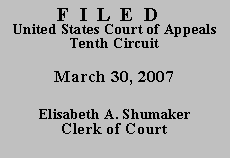

| UNITED STATES OF AMERICA, | |
| v. | |
| MICHAEL DELEVAN ENGLES, |
David J. Phillips, Acting Federal Public Defender
, and Barry L. Derryberry, Research & Writing Specialist, Office of Federal Public Defender, Northern & Eastern Districts of Oklahoma, Tulsa, Oklahoma, for Defendant - Appellant.David E. O'Meilia, United States Attorney
, and Kevin Danielson, Assistant United States Attorney, Tulsa, Oklahoma, for Plaintiff - Appellee.
I. BACKGROUND
While on patrol just before midnight on May 27, 2003, Officer David Shelby saw Mr. Engles at a car wash in Tulsa, Oklahoma. Two months earlier Shelby had issued Mr. Engles a citation for driving with a suspended license. The day after that encounter an informant had told Shelby that Mr. Engles's car had contained a large amount of methamphetamine that the officer had failed to detect. Shelby performed a computer check to determine whether Mr. Engles's license was still suspended. It was, so when Mr. Engles drove away from the car wash, Shelby followed him and turned on his emergency lights. Mr. Engles stopped after turning into a restaurant parking lot about three blocks from the car wash.
As he approached Mr. Engles's vehicle, Officer Shelby saw the handle of a large sheath knife between the center console of the vehicle and Mr. Engles's right leg. He drew his gun, ordered Mr. Engles and his passenger, Kimberly Dixon, out of the vehicle, and arrested Mr. Engles for driving under suspension. After conducting a records check on Ms. Dixon, he arrested her on an outstanding warrant for driving under suspension. A female police officer soon arrived to search Ms. Dixon and discovered on her person two bags of marijuana and two metal cylinders containing what appeared to be narcotics.
Officer Shelby called for a drug dog, which arrived within 25 minutes. Upon circling the vehicle the dog alerted to both the trunk and the driver's door of the vehicle. Police officers opened the trunk and discovered a large duffle bag, which contained marijuana, methamphetamine, cocaine, and a loaded handgun. Once the vehicle was searched, it was towed and impounded in accordance with Tulsa Police Department procedures.
After his indictment Mr. Engles filed a motion to suppress the evidence found in his car. The district court denied the motion. On appeal Mr. Engles challenges that ruling.
II. DISCUSSION
"When reviewing the denial of a motion to suppress, we view the evidence in the light most favorable to the government, accept the district court's findings of fact unless clearly erroneous, and review de novo the ultimate determination of reasonableness under the Fourth Amendment." United States v. Apperson, 441 F.3d 1162, 1184 (10th Cir. 2006) (internal quotation marks omitted).
Mr. Engles does not challenge the validity of the initial stop, his arrest, or the arrest of Ms. Dixon. But he contends that his vehicle was unlawfully detained while the officers awaited the drug dog, because they lacked reasonable suspicion to believe it contained contraband. The district court ruled that the discovery of drugs on Ms. Dixon provided reasonable suspicion.
In our view, however, reasonable suspicion was unnecessary. The officers did not "detain" the vehicle. They lawfully arrested Mr. Engles and his passenger. The automobile was parked in a restaurant parking lot; it was going nowhere. Because they were under arrest, neither Mr. Engles nor his passenger could drive it away. And Mr. Engles does not suggest that they were prohibited from contacting someone else to remove the car.
A dog sniff of the exterior of a vehicle parked in a public place does not require reasonable suspicion because it is not a Fourth Amendment intrusion. See United States v. Hunnicutt, 135 F.3d 1345, 1350 (10th Cir. 1998) ("A canine sniff itself does not implicate Fourth Amendment rights because of the limited information it provides and its minimal intrusiveness.") (citing United States v. Place, 462 U.S. 696, 707 (1983)); United States v. Ludwig, 10 F.3d 1523, 1527 (10th Cir. 1993) ("[R]andom and suspicionless dog sniffs [of cars in open parking lots] are not searches subject to the Fourth Amendment."). If the arresting officers had merely taken Mr. Engles and Ms. Dixon from the parking lot to jail, an officer who later came upon the scene could have employed a dog to sniff the exterior of the vehicle for drugs. It is irrelevant that the two arrestees remained at the scene from the time that the drug dog was summoned until it arrived.
It is undisputed that once the dog alerted to the trunk and side door, the officers had probable cause to search the car and its contents. See United States v. Rosborough, 366 F.3d 1145, 1152 (10th Cir. 2004). The conduct of the officers was therefore lawful throughout the incident.
Because no illegality tainted the actual search, we need not address the district court's alternative ruling that even if the actual search were unlawful, the evidence would inevitably have been acquired in a lawful inventory search.
III. CONCLUSION
We AFFIRM the judgment below.
*.After examining the briefs and appellate record, this panel has determined unanimously to honor the parties' request for a decision on the briefs without oral argument. See Fed. R. App. P. 34(f); 10th Cir. R. 34.1(G). The case is therefore ordered submitted without oral argument.